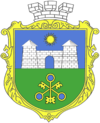Tatarbunary
|
Tatarbunary Татарбунари |
|||
|---|---|---|---|

Dormition Church in Tatarbunary
|
|||
|
|||
| Country |
|
||
| Oblast | Odessa Oblast | ||
| City | Tatarbunary Raion | ||
| Population (2015) | |||
| • Total | 10,991 | ||
| Time zone | EET (UTC+2) | ||
| • Summer (DST) | EEST (UTC+3) | ||
Tatarbunary (Ukrainian: Татарбунари; Romanian: Tatarbunar; Russian: Татарбунары, Turkish: Tatarpınarı) is a small town in the Odessa Oblast (province) of south-western Ukraine. It is the administrative center of the Tatarbunarskyi Raion (district), and is located north of the Danube Delta, in Budjak area, approximately 100 kilometers (62 mi) south-west of the oblast center, Odessa. Population: 10,991 (2015 est.)
The word "Tatarbunary" means "Tatar Wells" in South Slavic languages, with "bunar" borrowed from Turkic "pınar", "well". The name Tatarbunar is mentioned by Dimitrie Cantemir in his work (1714-1716).
The settlement appears to have been founded in the 16th century, when the Principality of Moldavia, became dependent of the Ottoman Empire. Later it was annexed by the Russian Empire in 1812 along with Bessarabia (eastern half of the Principality of Moldavia). In the wake of the Russian Revolution, the region was claimed by the Moldavian Democratic Republic, the Ukrainian People's Republic and the Odessa Soviet Republic. Ultimately occupied by Romanian troops in mid February 1918, it formally became part of the Kingdom of Romania in March, after a regional council in Chişinău proclaimed the whole of Bessarabia united with the latter. During 1924, the settlement was the site of a peasants' revolt known as the Tatarbunary Uprising.
...
Wikipedia


